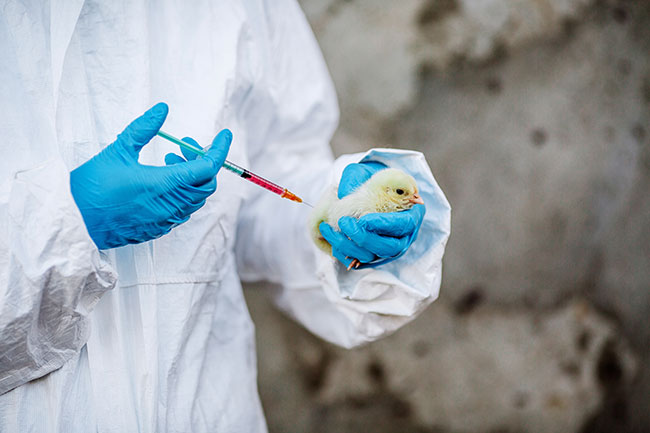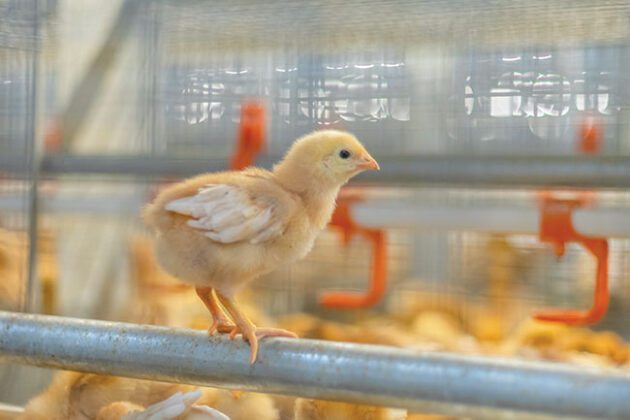
Industry debates vaccinating against HPAI
By Tree Hein
Features Disease watch LayersA close look at industry discussions and progress.
 With the persistence of the current strain of highly pathogenic avian influenza circulating, poultry industries across the globe have begun contemplating vaccination strategies.
PHOTO CREDIT: Adobe Stock
With the persistence of the current strain of highly pathogenic avian influenza circulating, poultry industries across the globe have begun contemplating vaccination strategies.
PHOTO CREDIT: Adobe Stock Over the last year or so, highly pathogenic avian influenza (HPAI) has again taken centre stage on the global poultry disease front, and discussion of vaccination is heating up. This is especially because the current strain of HPAI is persistent and seems to be endemic in wild bird populations.
The International Egg Commission (IEC) conference in Europe in September has two sessions on AI vaccination: ‘The Future of Avian Influenza Prevention’ by Dr. Ben Dellaert of Avined in The Netherlands and ‘Opportunities and challenges of AI Vaccination’ by Dr. Arjan Stegeman, professor at Utrecht University, The Netherlands. However, these experts cannot comment until after the conference has ended.
IEC also has an AI Global Expert Group, which was established in 2015 and brings together top scientists and experts from around the world to propose practical solutions to combat avian influenza in the short, medium and long term. In the U.K., a consortium of eight groups headed by the Animal and Plant Health Agency have formed a new project called ‘FluMap,’ looking at AI viral evolution, entry onto farms and control methods, including vaccination.
However, there are many questions in Canada and elsewhere about whether vaccination is an effective and feasible control option for some groups of poultry or in any of them.
Indeed, AI vaccination is impossible for broilers because of the 21-day withdrawal time and because only killed vaccines can be used. “It’s the same issue for turkeys” says Dr. Jean-Pierre Vaillancourt, a professor at University of Montreal and a member of CRIP Swine and Poultry Infectious Diseases Research Centre. “They live longer but using a killed vaccine would be an issue.”
A close look at vaccines
As Dr. Mart de Jong, a professor of Quantitative Veterinary Epidemiology at Wageningen University in the Netherlands, noted in a recent story in the University’s research magazine, one major question about new vaccines against AI is “whether they are effective enough – whether they provide sufficient protection against transmission.”
De Jong added that “many of the existing vaccines work well in the lab, but their effectiveness in the field is very disappointing. This is especially true of the traditional vaccines, which consist of an inactivated virus. With them, we see much lower quantities of antibodies in the field. The question now is whether this is also the case with newer types of vaccine.”
Dr. Mike Petrik, veterinarian director of technical services at McKinley Hatchery in St. Mary’s, Ont., explains, “We currently have vaccines that seem to reduce clinical signs, but don’t get rid of viral spread.” This generally means that the level of antibodies created in the bird’s body in response to the vaccine is too low to provide adequate protection against virus transmission and vaccinated birds can still pass on the virus.
Says Petrik’s, “If we vaccinate, it is likely that the virus will continue to circulate in the Canadian flock. It will be very important to have a vaccine that can be differentiated from a field virus, so that if a flock tests positive, we will know for certain whether it was from the vaccine, or whether they have influenza virus exposure.” This is called the ‘DIVA’ (Differentiating Infected from Vaccinated Animals) strategy.
This aspect of potential AI vaccination ties strongly into serious trade concerns. Importing countries obviously only want healthy animals to enter. In addition, existing trade agreements prohibit vaccination.
Petrik notes that Canadian firms export significant numbers of genetic poultry stock to a great number of countries around the world. He explains that if we vaccinate for AI in Canada, we will need trade agreements that address this, and it may be difficult to get agreements with all the countries involved.
When contacted for comment, United Egg Producers (UEP) in the U.S. also revealed concerns about trade. The organization states, “While our farmer-members have not taken a position on AI vaccinations, UEP appreciates the U.S. Department of Agriculture’s continuing consideration of an AI vaccine. We strongly encourage continued discussion in close collaboration with national and international poultry industry leaders and regulatory authorities, especially as it relates to the complexities around both the science and the potential trade implications of HPAI vaccines.”

While vaccinating broilers and turkeys isn’t an option due, in part, to trade issues, there have been discussions around administrating it to layers.
PHOTO CREDIT: Big Dutchman
Costs and more
Another issue with AI vaccination is how it could be accomplished affordably. The vaccine must be injected, which involves a huge amount of manual labour. A vaccine that could be administered by water is a possibility.
However, no matter the type of delivery, any AI vaccine must address the current strain or strains. That is, as the global poultry industry well knows, new AI variants are constantly emerging through genetic mixing, the same thing that happens with human flu viruses.
Overall, Vaillancourt does not foresee widespread AI vaccination occurring in Canada, nor even in France, where the current AI outbreaks in Europe – the worst in history – have mostly been concentrated. “The strategy will be to target certain regions and types of birds: breeders, layers, ducks,” he says. “We need to look at backyard flocks as well.”
The broiler breeder and turkey producers in the U.S. are against the use of a vaccine due to trade issues, says Dr. John Clifford, who was Chief Veterinarian at the U.S. Department of Agriculture and now works for the U.S. Poultry and Egg Export Council.
“With layers, you can still get infection with vaccinated birds,” he adds, “and the cost is prohibitive. There is the cost of the vaccine, and there are also the costs associated with a DIVA strategy or sentinel strategy, where unvaccinated birds are placed with vaccinated birds in the same facility and tested for infection.
“Vaccine companies would need a big market in order to develop an AI vaccine, and I don’t see this market existing in the U.S. and other countries that do a lot of poultry trade. It could be an effective tool in eradication efforts and for those countries that do not export.”
For his part, Petrik believes the Canadian poultry industry needs to take more time with the topic of AI vaccination.
“My feeling is that we will need to wait and see what this fall and next year bring with respect to the impact of the wild virus, to determine whether it makes sense to start a vaccine program,” he says. “But there is a great deal of interest in Europe and the U.S. in investigating vaccination, so it’s a discussion that is definitely getting more traction now than ever before.”
The Canadian Food Inspection Agency has studied vaccination as a strategy against the spread of AI and has created guidelines around its effective use. The agency states that these guidelines “are part of an internal document, which is not available to the public. The option to vaccinate may be considered depending on the circumstances of the outbreak. Various outbreak conditions and physical and resource limitations will have an impact on which control measures will be the most effective.”
Print this page